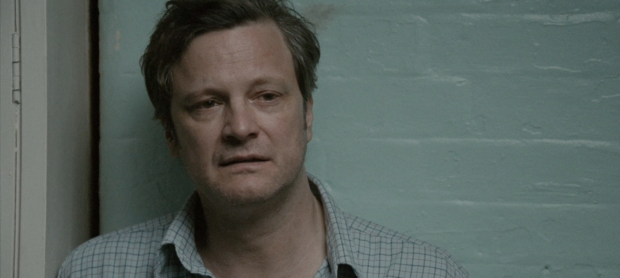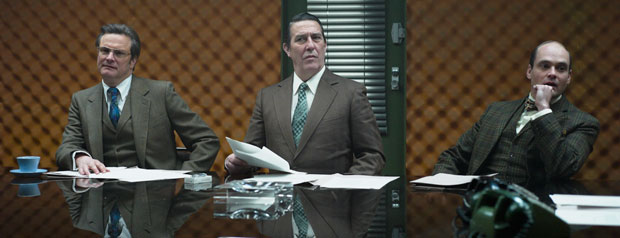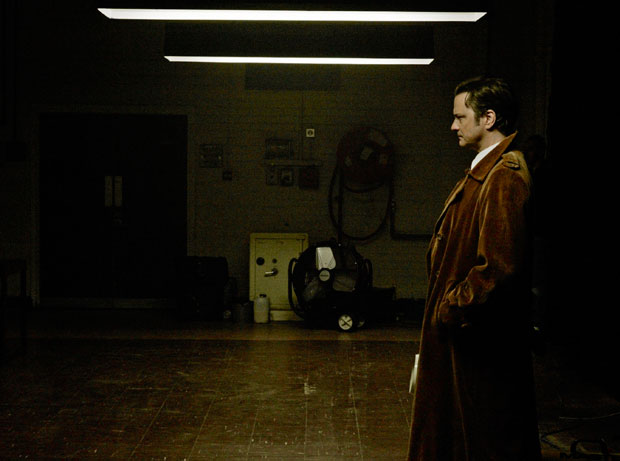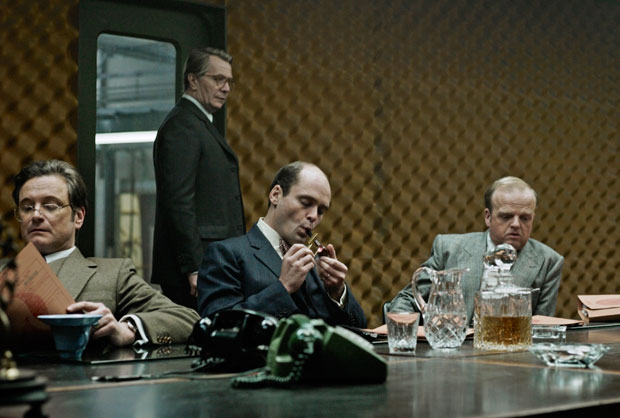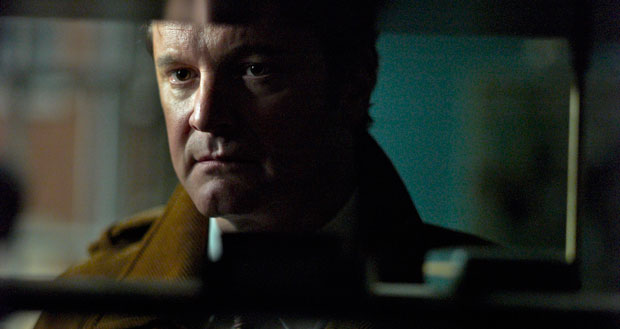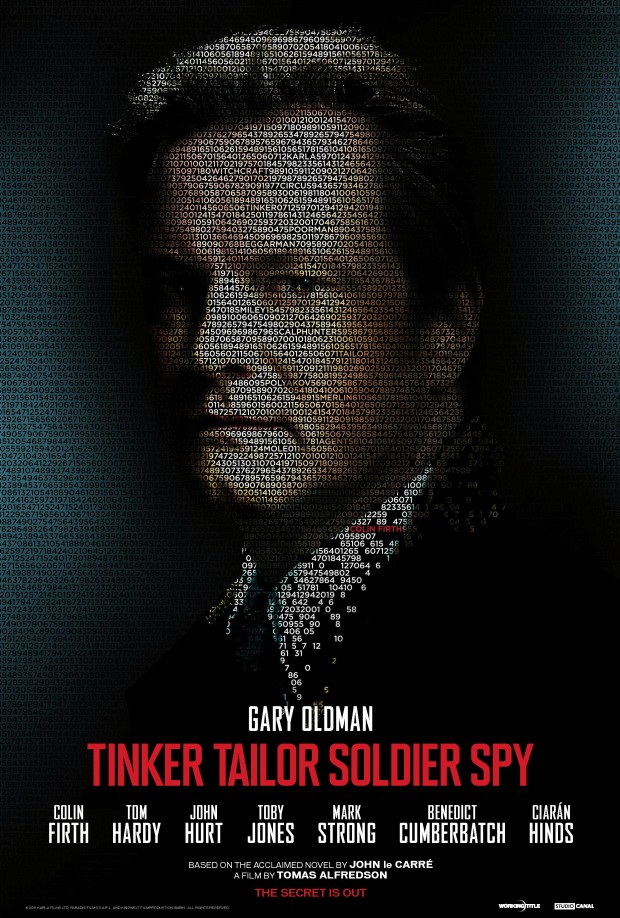After seeing Tomas Alfredson‘s hotly-anticipated Tinker, Tailor, Soldier, Spy – and adoring every crisply measured, atmospherically-stunning minute of it – I had the opportunity to sit down with some of the film’s primary contributors in a roundtable setting at New York’s Waldorf Astoria Towers. The interviews were conducted in small rooms with about six or seven other journalists, all of whom took turns eagerly questioning the film’s uniformly impressive cast of creators for their information and insight.
Below is the question-and-answer conversation that resulted with Oscar-winner Colin Firth, who plays the flamboyant Bill Haydon in the film. Like all of Tinker‘s supporting performers, Firth is relegated to minimal screen time (this is a film that truly defines the term “ensemble”), but the subtle perceptivity he brings to his character leaves a lasting imprint.
Some of the highlights of the dialogue below include Firth‘s sensible, straight-arrow dissection of technology’s presence in modern filmmaking. (Indeed, because of Tinker‘s machinery-absent 1970s setting, the topic of technology became a major talking point with all of the interview subjects.) Firth also unveiled a delightful anecdote detailing an experience he had shooting a scene with the legendary Laurence Olivier on the 1986 mini-series Lost Empires.
Be sure to check back tomorrow for an account of Gary Oldman‘s interview. The conversation with Alfredson and co-writer Peter Straughan, meanwhile, will debut on Friday.
Does the wardrobe in this film help you get into character?
Colin Firth: It does become part of the discussion, yeah. We did make a decision. There are a lot of protocols that Haydon followed – like when he was at organization, you know, you do show up in a suit and tie, it’s the military. But I think Haydon has his little rakish things that he wants to assert and hence the red socks. [Laughs] Just to say ‘I’m a little bit Bohemian,’ ‘I get to play with convention,’ ‘I’m confident and I’m charismatic.’ That’s where he stands on himself. So I thought let’s not make him look like an [average] city business guy. [He’s] free of convention.
Why did you decide to do this film? Was it the classic story? The director?
Well, the whole thing wasn’t attached. I was actually the first of the current cast involved. So when I was talking to Tomas Alfredson, none of these actors were involved at the time. [But] I would’ve played any part in this. Partly because of the project as a whole appeals to me, the whole aura of it appeals to me, Tomas Alfredson appeals to me. It’s also partly because the characters themselves all are interesting enough, even if we only got [a chance] to kind of nibble at them, if you like. They’re all interesting enough to have their own story told. If you could follow them off-screen, you could follow them into a world where there’s a film to be made about each of them. And so I would’ve very happily taken on any of them, really.
Can you talk about some of the things you brought to this character that maybe a modern spy would not have done? Mannerisms that [perhaps] reflected the era and the personality of that time.
I don’t know because you’ll always find someone who is a bit of an anachronism. I’m not saying anything he would’ve done would’ve been impossible in a different time. I mean, his ideology is hard to imagine now, because the East and the West are not polarized in the way they were, communism and capitalism are not polarized in the way they were. And communism has obviously been discredited, and I think capitalism is being fairly discredited now as well. So I don’t think people live in a world of idealizing those things. In terms of mannerisms and things, I think he’s – you know, I was very conscious of him being a man of a certain era. A devoutly, Oxford-educated, sort of artistic type. I think you sometimes just look at the world you’re in, look at the clothes you’re wearing, the environment around you and the language you’re being given to speak and it plays itself. You don’t have to impose decisions on that. They just occur to you.
What surprised you the most about the final cut of the movie?
I suppose I was surprised that it was so well-achieved. But I knew that Tomas Alfredson was not going to lean on excessive dialogue and information. You know, one of the frightening things about taking on an adaptation of this book is that it’s dense. A lot of information is conveyed through complex dialogue. And there’s a lot of detail. The challenge was to [trim] that down – well, I imagine they already had to [trim] it down to do six hours of television back in the ’70s – but to [trim] it down to two hours, and to not only do that, but to actually [trim] it down even more so that you get two hours with very little dialogue. And it was amazing to me how well that worked. What kind of blew me away a little bit was I knew the book well and I knew [that there were] some struggles in the cutting room – yet [to] go down to two hours, you watch the movie, and there are [long sequences] with no talking. I [was wowed].
They were worried about how much time they had to tell the story, and you spend ten minutes watching Gary Oldman walk down a street. [Laughs.] And I loved it, because it showed such confidence. And the music was incredible. Moody. And [the film] looked so sad. This man in his raincoat getting his new glasses put on. That told me much more about the fact that I was getting into something that was going to commit me to be interested in this person, and that it was an emotional story, there was something personal going on. Because if you’re going to confuse people – and this film does confuse people, will confuse people – I think people like to be a little bit stretched. They like to have a puzzle. And I think almost everybody comes out thinking they haven’t quite grasped everything. But, mostly, it’s in a way that makes people want to go back, rather than say ‘I was annoyed.’ And you do that by drawing people in. And you can do that if you magnetize people, and I think it does that. Gary [Oldman] is such a magnetic actor at the end of the day. Those shots and that sense of melancholy, the sense of stately pace and silence, are far better currency in film than just a bunch of information.
When you were the first person signed on to this, did they ask you what role you wanted to play?
No, no. It was Haydon. I would’ve said Smiley, come on. [Laughs.]
Gary Oldman was saying that he enjoyed so much the retro style and the film’s slow pace. Where do you stand in terms of technology and [its use] in moviemaking?
I don’t [really] stand anywhere on it. I mean, if it’s good, it’s good. I don’t think technology has to be the enemy. I think you could do extraordinary things with it as long as you don’t drown your story. It’s very interesting, the debate about Avatar. I happen to really like it. I liked what it was saying, quite aside from being dazzled by, you know, all the stuff that was floating around me. People, I think, can sometimes have a prejudice against something because it’s so technologically highly-achieved that they won’t see any heart in the thing. But I thought that wasn’t the case. I thought it was well-acted and [there was] a thoughtful story. So it was legitimate. On the other hand, it can simply be a very practical impediment. If you have devices which solve all your problems, you have to then work out what kind of conflict you’ve got. “We’ve got an [indestructible] enemy. Press a button.” Story’s over. [Laughs.] I’ve had this struggle with the business of mobile phones in storytelling, because so much can get dealt with now in a phone call. [There are things] you could take a whole movie to deal with if there wasn’t a mobile phone. [Laughs.] And I’ve just done a script actually called Arthur Newman, about a guy’s journey across America and he’s sort of disappeared from his old life. The script was written twenty years ago, originally. And, for that reason, mobile phones don’t really appear in it. And I’m very happy for them not to appear. Because the minute you decide that this guy’s got a phone in his pocket, you know, [it changes completely]. Or you could have a story about a guy who has to travel 3,000 miles in order to relay something to somebody and that could [actually] be over in a phone call, [destroying] amazing things that could’ve happened along the way.
Now I’m being slightly [pessimistic] about this. There are ways around these things and there are films that use them brilliantly. I just think the fact that you’ve got things that solve problems for us can sometimes conflict with drama. [But] the interesting thing with espionage – the little I know about it – [is that] aesthetically it’s wonderful. I think there’s a big appetite to look at low-tech stuff. I think a number of people [want] to see reel-to-reel tape recorders and actual typewriters that clack and elevators where you see the pulleys. And, you know, the fact that things can’t be solved with a microchip or a satellite. But, from what I understand, the spies don’t rely that much on the technological stuff, because it’s unreliable. I’m not talking about drones or anything, but the kind of stuff these guys are doing. You don’t carry a cell phone around where you could be found – because it’s traceable. They use paper still. And so do the mafia. This guy they arrested in Sicily, who’s been on the run since the year I was born, since 1960, he wasn’t caught largely because of that – he never had a computer or a cell phone, never had anything that would be traceable or hackable or recordable or reproducable. He wrote his instructions down on minuscule pieces of paper, basically like lint in his pocket, and trusted only his family. Lived most of his life in a tree, from what I understand. [Come to think of it], I don’t know what the point of being a mafia boss is if you live in a tree. [Laughs.]
How has your experience as a theater actor enriched your experience as a film actor?
I don’t know. I think everything, if you let it, will enrich everything else. I’ll tell you what it is, really. There are probably all sorts of ways one could answer that question, but the thing that jumps to mind is [that] it’s only in the theater that you get to experience what a rehearsal can be. Films don’t really have them. You can have some very valuable moments of trying to explore [things briefly], but you can’t do it the way you can in the theater where you hopefully have at least four weeks. You know, there are some universities in which their theater – you hear stories of the Moscow Art Theater rehearsing for a year. So these people know so well what they are and what they’re doing. But that business of actually trying something out and having this extraordinary first instinct, which might be a good one, and then putting it to the test and getting it on its feet and getting gradually off the script and learning the whole play from beginning to end – then you realize all your inspiration is kind of dying around you on the second week and you don’t know what’s happening, there’s no energy and you’re never going to get it. [Laughs.]
And then actually starting to kind of rediscover things. You just plow on and on and on, and you make mistakes, and you try other things because you gave up one move and picked up another. And there will be a dead zone, if you do that. And you will hopefully come out of it. With film, you are very dependent on that first instinct thing because you don’t have much rehearsal. You have to think on your feet and hope the camera is there to catch it. If you rehearse a bit, you’re likely to get caught in the dead zone and get stuck there. That’s the trouble, because you can’t have a brilliant first impulse all the time. You can’t just keep lightning in the bottle like that, so unless you’ve got time to see it through. You know, too much rehearsal in film is dangerous, unless you really do a lot.
What did you learn from Laurence Olivier after working with him early in your career?
He’s very practical in his approach to work. He was utterly fearless. He didn’t care how things sounded or what he did, he just tried and tried and tried things. He did something called ‘hang your hat on it:’ [when] there was a word he was struggling with, instead of flipping over it, he just, when he came to the word, yelled it. It was weird. It actually sounded so idiosyncratic he couldn’t have possibly been acting. It sounded like a real person talking. He had a little moment. Just to tell you a story, a little moment of dialogue he had where we all expected him to be melodramatic because he was the great Shakespearian theater actor. I had a scene with him sitting on a train and he’s playing a comedian [who] thinks everyone is after him and the reason he’s failing on stage is because there’s a conspiracy. And he’s decided he’s going to get the person responsible. And he’s telling me about this and he’s got a case next to him and he says, ‘If I find out who does it, I’ll tell you what they’re gonna get.’ And the stage direction said, ‘They’re gonna get this,’ and he swings the case open and there’s a gun and he flourishes it and the train whistles and it goes into a tunnel. And I thought, I can’t wait to see him do all of that. [Laughs.] And, so, he said, ‘You know what they’re gonna get? They’re gonna get this,’ and he looked away, and just tipped the suitcase open with his left hand – the tip of the gun was showing. And it was the opposite, you know. It was so tiny. It was actually, to sit opposite, really shocking. It was far more dramatic than if he had just waved it about. And so it was just his instinct to say, ‘Okay, here’s what they’re telling me to do. I’m going to subvert it completely.’
Tinker, Tailor, Solider, Spy hits limited theaters Friday, December 9th.


